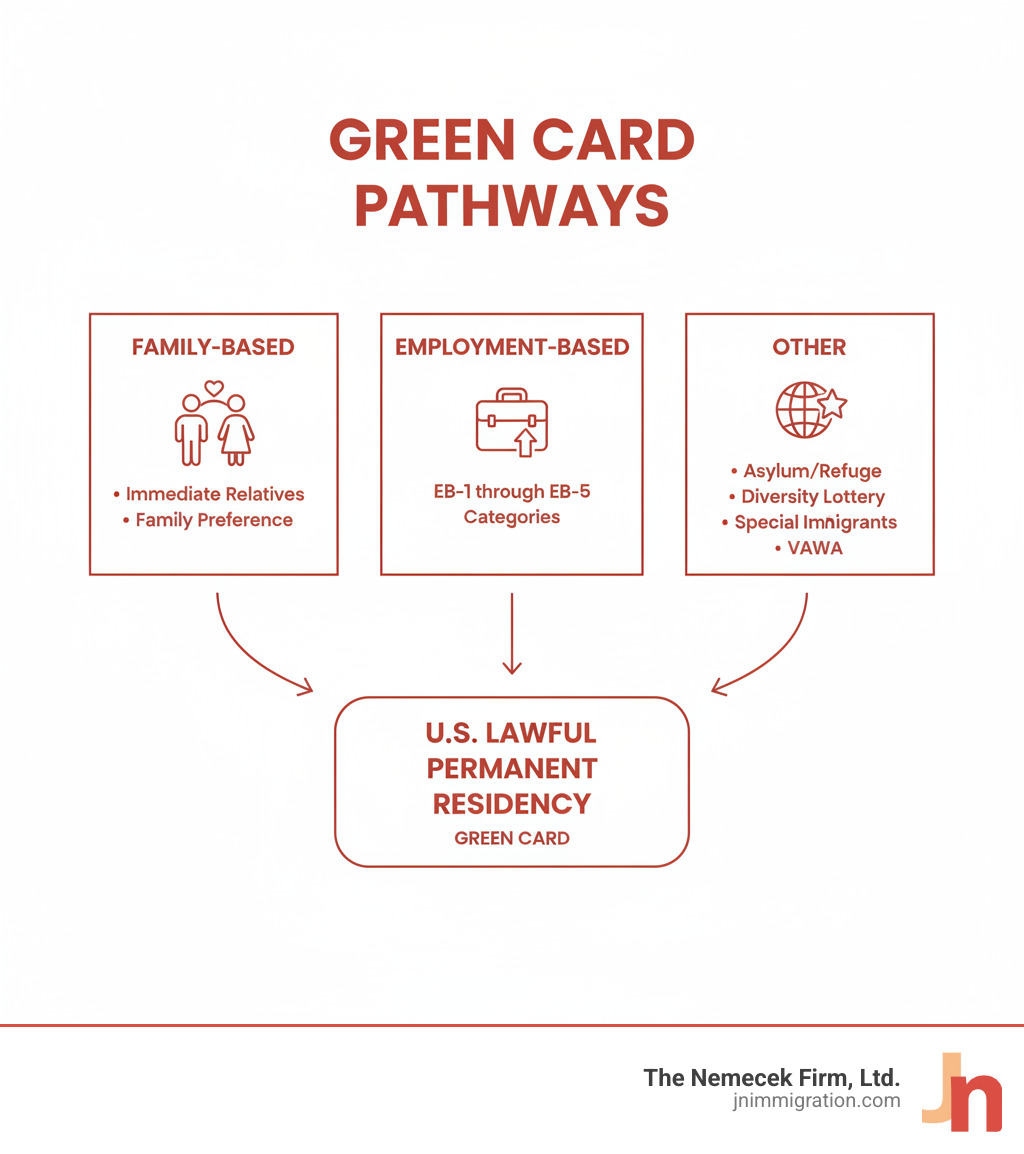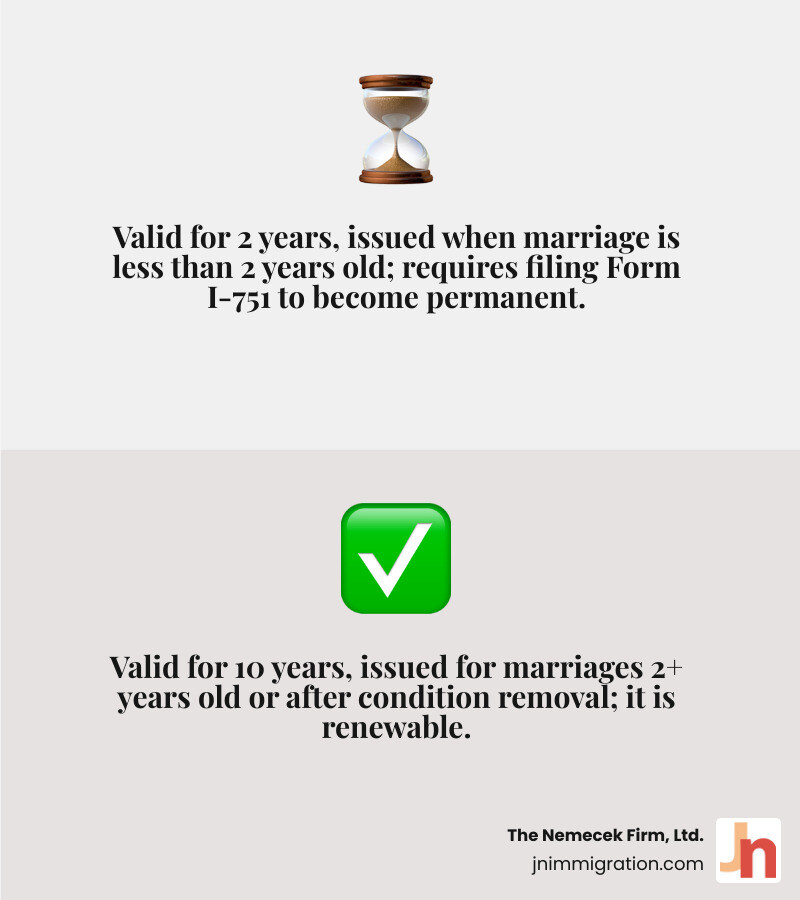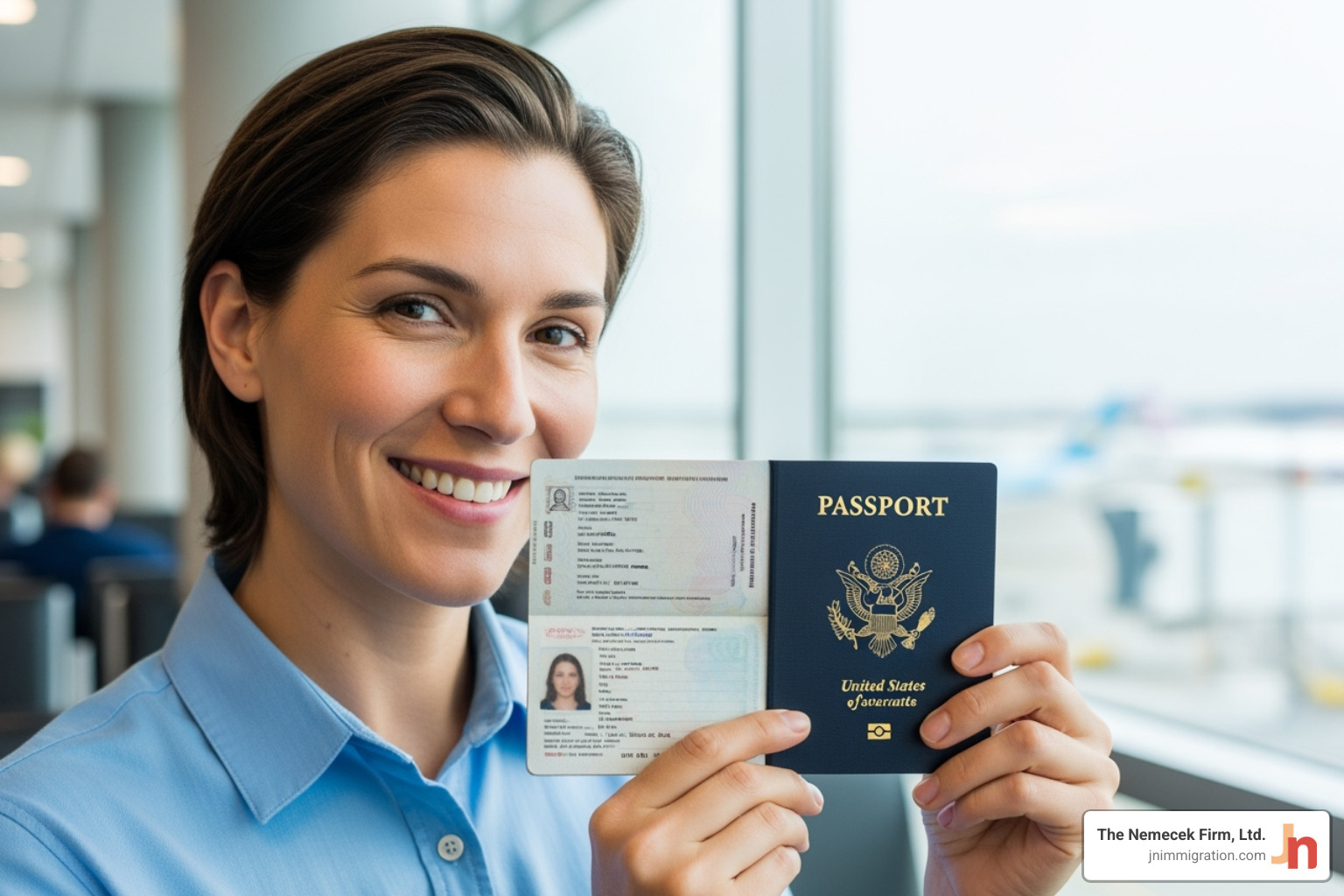
An immigration lawyer for green card applications helps you steer one of the most important legal processes in your life—obtaining lawful permanent resident status in the United States. Before you hire an attorney, you need to know what questions to ask to ensure they’re the right fit for your unique situation.
Quick Answer: What to Look For in a Green Card Immigration Lawyer
What Is a Green Card?
A green card (officially called a Permanent Resident Card) grants you the legal right to live and work permanently in the United States. It’s also your pathway to eventually becoming a U.S. citizen through naturalization.
The benefits are substantial: you can sponsor family members, access educational opportunities and financial aid, receive protection under U.S. laws, and qualify for Social Security and Medicare.
Why the Right Lawyer Is Critical
The green card process involves complex paperwork, strict deadlines, and detailed USCIS procedures. One mistake can lead to months or years of delays—or even a denial. For LGBT individuals and couples, the stakes are even higher, as you may face unique legal challenges around marriage recognition, asylum claims based on persecution, or navigating immigration systems in countries where your relationship isn’t legally recognized.
Processing times vary dramatically. Family-based green cards can take 1 to 10 years depending on your relationship and country of origin. Employment-based applications typically take 1 to 6 years. An experienced immigration attorney doesn’t just fill out forms—they develop a legal strategy custom to your situation, help you avoid costly errors, and advocate for you when the system moves too slowly.

Before you share your personal story, your documents, or your money with anyone claiming they can help with your green card, you need to verify one critical thing: are they actually authorized to practice immigration law?
This might seem obvious, but immigration fraud is disturbingly common. The question “Are you a licensed attorney in good standing?” should be the very first thing you ask any potential immigration lawyer for green card applications.
What Makes Someone Authorized to Help You?
There are only two types of people legally allowed to represent you in immigration matters. The first is an attorney who is a member in good standing of the bar of any U.S. state, territory, or the District of Columbia—and who hasn’t been disbarred or restricted from practice. The second is an accredited representative working for a DOJ-recognized organization through the Office of Legal Access Programs.
Both can advise you on which forms to file, help you gather the right documents, explain your immigration options, fill out USCIS forms with you, and communicate directly with USCIS on your behalf. These are the only people you should trust with something as important as your future in America.
You can verify an attorney’s credentials through your state’s bar association website or check the List of Currently Disciplined Practitioners to see if they’ve been expelled, suspended, or disbarred. The American Bar Association also offers resources for finding an authorized legal representative in your area.
The “Notario” Public Trap
If you or your family come from Latin America, you might be familiar with the term “notario público.” In many countries, a notario is a highly trained legal professional—almost like an attorney. But in the United States, a notary public is simply someone authorized to witness signatures on documents. They have no legal training and cannot give you immigration advice.
Unfortunately, some unscrupulous people exploit this confusion. They call themselves “notarios” and charge vulnerable immigrants for services they’re not qualified to provide. The results can be devastating: incorrectly filed paperwork, missed deadlines, denied applications, wasted money, and in the worst cases, deportation.
Unless your notary is also a licensed attorney or accredited representative, they cannot help you with your green card. Always ask to see current licensing documents and verify them independently.
Experience Matters Just as Much as Authorization
Once you’ve confirmed someone is authorized, dig deeper into their experience. How many years have they practiced immigration law specifically? What’s their track record with cases like yours? Have they handled family-based petitions, employment sponsorships, or LGBT immigration cases before?
Generic experience isn’t enough. Immigration law is vast and specialized. An attorney who primarily handles deportation defense might not be the best choice for an employment-based green card application. You want someone who has successfully steerd your specific pathway multiple times.
For instance, The Nemecek Firm has over 30 years of combined experience in immigration law, with particular expertise in employment-based cases and LGBT immigration matters. This depth of experience means they’ve likely encountered scenarios similar to yours and know exactly how to handle the complications that can arise.
Don’t be shy about asking for specifics. A confident, experienced attorney will be happy to discuss their success rates and share examples of cases they’ve won.
Technically, yes, you can file for a green card without an attorney. USCIS doesn’t require you to hire one. But here’s the reality: the green card process is one of the most complex legal procedures you’ll ever encounter, and the stakes couldn’t be higher.
The Paperwork Is Genuinely Overwhelming
A green card application isn’t just one form. Depending on your category, you might need to file Form I-130, I-140, I-485, I-864, and several others—each with its own instructions, supporting documents, and filing fees. Each form asks detailed questions about your background, your family, your work history, and your travels.
One small mistake—a missed signature, an incorrect date, a missing document—can trigger a Request for Evidence (RFE) that delays your case by months. Or worse, it can lead to an outright denial. An experienced immigration lawyer for green card applications knows exactly what USCIS expects and ensures everything is correct the first time.
USCIS Procedures Change Constantly
Immigration policy isn’t static. New regulations, policy memos, and procedural changes happen regularly. What worked for your cousin’s green card application three years ago might not work today. Attorneys stay current on these changes because it’s their job. They know which forms were recently updated, which processing centers are experiencing delays, and how recent policy shifts might affect your case.
You Need a Legal Strategy, Not Just Form-Filling
Here’s what separates a good immigration attorney from a document preparer: strategy. An attorney doesn’t just fill in blanks—they analyze your entire situation, identify potential problems before they arise, and develop a plan to maximize your chances of approval.
Maybe you have a complicated employment history with gaps that need explanation. Perhaps you traveled outside the U.S. for extended periods. Or maybe there’s something in your background that could raise questions. An attorney knows how to present your case in the strongest possible light and prepare you for what’s coming.
Someone to Advocate When Things Go Wrong
Even perfect applications can face delays. USCIS might sit on your case for months beyond normal processing times. You might receive a confusing RFE. Your interview might not go as smoothly as you hoped.
When these situations arise, you need someone who can communicate with USCIS on your behalf, file service requests, respond to official notices, and if necessary, take legal action like a Mandamus lawsuit to compel a decision. You can’t do this effectively on your own.
Peace of Mind Has Real Value
The immigration process is stressful. It affects your ability to work, travel, and plan your future. It impacts your family. The uncertainty alone can be overwhelming.
Having an experienced professional handling your case—someone who’s done this hundreds of times and knows what to expect—provides something invaluable: peace of mind. You can focus on your job, your family, and your life while your attorney handles the legal complexity.
If you’re ready to discuss your specific situation with someone who understands both the technical requirements and the human side of immigration, The Nemecek Firm offers immigration case consultations where you can get honest answers about your options.

Not all immigration attorneys are created equal. Just like you wouldn’t ask a tax attorney to handle your divorce, you shouldn’t assume every immigration lawyer for green card cases has deep experience in every category. The green card world is surprisingly diverse, and the path that works for one person might be completely different from what you need.
When you’re interviewing potential attorneys, be direct. Ask them: “How many cases like mine have you handled? What were the outcomes?” Their answer will tell you a lot about whether they’re the right fit for your situation.
Family-based green cards are the most common route to permanent residence. If you’re a U.S. citizen or lawful permanent resident hoping to bring a spouse, parent, child, or sibling to the United States, you’ll need an attorney who understands the nuances of proving genuine relationships. They should know how to handle everything from documenting previous marriages to gathering the mountain of evidence USCIS requires to verify family connections.
For those coming to the U.S. through work, Employment-Based Immigration Services require a completely different skill set. The attorney you choose should be fluent in the language of PERM labor certifications, National Interest Waivers, and the various EB categories—from EB-1 for individuals with extraordinary ability to EB-5 for immigrant investors. The employment-based process involves intricate coordination between you, your employer, and USCIS, and mistakes can cost your employer thousands of dollars and months of delays.
Asylum or refugee status represents one of the most emotionally challenging paths to a green card. If you’ve fled persecution in your home country, you need an attorney who not only understands asylum law but also knows how to tell your story in a way that meets the strict legal requirements. One year after receiving asylum or refugee status, you become eligible to apply for a green card—but getting to that point requires skilled advocacy.
The Diversity Visa Lottery might sound straightforward—after all, it’s a lottery—but even winning requires careful attention to detail during the application process. An experienced attorney can guide you through eligibility requirements and ensure you don’t make a mistake that could disqualify you from this rare opportunity.
Some situations fall under Special Immigrant categories: religious workers bringing their calling to American communities, special immigrant juveniles who’ve been abused or abandoned, certain international broadcasters, and foreign nationals who’ve served the U.S. government abroad. Each of these paths has its own unique requirements and documentation standards.
For LGBT individuals and couples, the immigration journey can present challenges that straight couples never face. Questions about marriage recognition, asylum claims based on persecution due to sexual orientation or gender identity, and navigating systems in countries where your relationship isn’t legally recognized all require an attorney who truly understands these issues. At our firm, we have specific expertise in LGBT immigration cases, ensuring your rights are protected and your relationship receives the respect it deserves under U.S. law.
We handle a comprehensive range of Green Cards and can speak directly to our experience with your specific circumstances. Don’t be shy about asking for concrete examples of similar cases and how they turned out.
“How long will this take?” It’s probably the first question on your mind, and honestly, it’s one of the hardest to answer. The timeline for your green card depends on which category you’re applying under, where you were born, and whether you’re already in the United States or applying from abroad.
Family-based processing times can range dramatically from 1 to 10 years or even longer in some cases. If you’re an immediate relative—a spouse, unmarried child under 21, or parent of a U.S. citizen—you’re in the fastest lane. There are no annual caps on immediate relative visas, which means you won’t be stuck waiting for your “number to come up.” Most immediate relative applications filed from within the U.S. through Adjustment of Status take about a year, give or take a few months.
Family preference categories are a different story. If you’re an adult child of a U.S. citizen, a married child, a sibling, or the spouse or child of a lawful permanent resident, you’re subject to yearly visa caps. This means you’ll receive a “priority date” when your petition is filed, and then you wait—sometimes for many years—until a visa becomes available for someone with your priority date from your country. High-demand countries face longer waits.
Employment-based processing times typically fall in the 1 to 6 years range, though they’re also affected by demand and country-specific backlogs. Categories for individuals with extraordinary abilities or advanced degrees often move faster than those for skilled workers, which can have significant wait times. When you apply from within the United States through adjustment of status, the process can take about a year once a visa is available, but the best way to get an accurate timeline is to speak with an experienced immigration lawyer for green card applications who can look at your specific details.
Understanding whether you’re dealing with immediate relatives versus preference categories is crucial. Immediate relatives get to skip the line, while preference categories must wait their turn based on the yearly visa caps. This single distinction can mean the difference between a one-year wait and a ten-year wait.
An attorney who knows your category inside and out can give you a realistic timeline based on current visa bulletin trends. They can also look for ways to potentially expedite your case or at least prepare you mentally and practically for the wait ahead. The uncertainty is hard, but having someone who’s walked this path with hundreds of other families makes it more bearable.
Before you commit to working with any immigration lawyer for green card applications, you deserve complete clarity about what lies ahead. The right attorney won’t just say “don’t worry, we’ll handle it”—they’ll walk you through every step, prepare you for potential hiccups, and give you honest numbers about what this journey will cost.
Think of your green card application as a road trip. You need to know the route, where the construction zones might slow you down, and how much gas money to budget. Let’s break it all down.
The Application Steps: Your Roadmap
The green card process isn’t a single form—it’s a carefully choreographed sequence of steps that varies based on your situation. For most people, it starts with an immigrant petition. If you’re pursuing a family-based green card, your U.S. citizen or lawful permanent resident relative files Form I-130 on your behalf. For employment-based cases, your U.S. employer typically files Form I-140. Some fortunate individuals, like those with extraordinary abilities or victims of abuse, can actually petition for themselves.
This sponsor does more than just sign papers. They’re making a legal commitment to support you financially and demonstrate that you won’t need government assistance—what immigration law calls becoming a “public charge.” It’s a serious responsibility, and your attorney should help both you and your sponsor understand what’s required.
Next comes your actual green card application. If you’re already living in the U.S. and eligible, you’ll file Form I-485, Application to Register Permanent Residence or Adjust Status. This is called Adjustment of Status, and it’s generally the more straightforward path. If you’re outside the United States, you’ll go through Consular Processing at a U.S. embassy or consulate in your home country. Each route has its own advantages and challenges, and an experienced attorney can advise which makes more sense for you.
Almost everyone will attend a biometrics appointment where USCIS collects your fingerprints and photos. Many applicants also have an interview with a USCIS officer, who’ll ask questions about your application while you’re under oath. Your lawyer should prepare you thoroughly for this interview so you know exactly what to expect.
When Things Take Longer Than Expected
Here’s the part nobody likes to hear: delays happen. A lot. USCIS processing times can stretch like taffy due to backlogs, policy changes, or issues they find with applications. Sometimes your paperwork gets caught up in security checks that take months. Sometimes you’re waiting for a visa number to become available in your preference category, watching the visa bulletin like it’s a suspense thriller.
The most common delay triggers are incomplete applications, incorrect information, or those dreaded Requests for Evidence (RFEs) where USCIS asks for more documentation. This is where a meticulous immigration lawyer for green card cases truly earns their fee—by getting everything right the first time.
But what if your case just sits there, gathering dust, with no explanation? A good attorney won’t shrug and tell you to keep waiting. They can file official inquiries with USCIS, submit service requests, and if necessary, explore legal actions like a Mandamus lawsuit. These lawsuits essentially ask a federal court to order the government to make a decision on your long-delayed case. While it sounds dramatic, it can be remarkably effective when your application has been unreasonably stalled.
The Money Talk: What You’ll Actually Pay
Let’s talk numbers, because surprises are only fun at birthday parties, not when dealing with immigration costs.
Your total expenses fall into two buckets. First, there are USCIS fees—the government’s non-negotiable charges for processing your petitions and applications. You’ll pay fees for Form I-130 or I-140, for Form I-485, for biometrics, and potentially others depending on your situation. These fees change periodically (usually upward, unfortunately), so your attorney should give you the current figures. Most applicants pay a $220 processing fee, and here’s a silver lining: friends, family members, or employers can pay these fees on your behalf if needed.
Second, there are attorney fees—what you pay for professional legal services. This is where transparency matters enormously. Ask for a clear, detailed fee structure upfront. What exactly does their fee cover? Are there any potential additional costs? At our firm, we believe in straightforward flat fees and offer payment plans because we know this is already a significant investment in your future.
Be cautious of any lawyer who’s vague about costs or mentions “additional fees” without explaining them. You deserve to know exactly what you’re paying for before you sign anything.
If you’re getting a green card through marriage, there’s an important twist you need to understand. Not all green cards last the same amount of time, and the difference isn’t arbitrary—it’s designed to protect the integrity of the immigration system.
When you receive a green card as the spouse of a U.S. citizen and your marriage is less than two years old, you’ll get a Conditional Green Card (technically called a CR1). It’s valid for only two years. Think of it as a probationary period. The government wants to make sure your marriage is the real deal, not just a shortcut to a green card.
Before those two years expire, you and your spouse must jointly file Form I-751, Petition to Remove Conditions on Residence. This form, along with evidence that your marriage is genuine, asks USCIS to remove the conditional status. Miss this deadline or fail to file, and your conditional status terminates. That means you lose your green card and could face deportation. It’s not something to put off until the last minute.
If your marriage was already two years old or more when your green card was approved, you skip the conditional period entirely and receive a Permanent Green Card (IR1) right away. This card is valid for ten years and is renewable. No Form I-751, no conditional period—just straightforward permanent residence.
Here’s a quick comparison to keep it straight:

A Word About Marriage Fraud
We need to address this directly: marriage fraud is a federal crime, and the consequences are severe. If USCIS determines that a marriage was entered into solely to obtain immigration benefits, you’re looking at up to five years in federal prison and a fine of up to $250,000. These aren’t empty threats—the government prosecutes these cases.
Any ethical immigration lawyer for green card applications will never, ever suggest anything fraudulent. Instead, they’ll guide you through the legitimate process of documenting your genuine relationship with photos, joint financial records, affidavits from friends and family, and other evidence that shows your marriage is real. If your relationship is authentic, you have nothing to worry about—your attorney will simply help you present the truth effectively.
Congratulations—you’ve got your green card! But before you celebrate too much, it’s important to understand that becoming a lawful permanent resident comes with both wonderful freedoms and important responsibilities. A knowledgeable immigration lawyer for green card applications will make sure you understand these obligations before you even begin the process, so there are no surprises down the road.

Maintaining Your Residency
Your green card grants you the right to live permanently in the United States—but “permanently” means you actually need to make the U.S. your primary home. The government expects you to maintain your status as a permanent resident, which means you can’t just get your card and then spend most of your time living abroad.
Extended absences from the U.S. can raise serious questions about whether you’ve abandoned your residency. If you’re planning to be outside the country for longer than six months, you may need to prove to the U.S. government that you haven’t given up your U.S. residence. For trips lasting more than a year, you should definitely apply for a reentry permit before you leave. This permit shows immigration officers that you intended to maintain your permanent resident status during your absence.
Traveling Outside the United States
The good news is that green card holders are generally free to travel internationally and return to the U.S. However, if your trip extends beyond six months, you might face additional questions from border officers when you come back. They may want to see evidence that you maintained ties to the U.S.—things like a home, job, bank accounts, or family members here. For absences over a year without a reentry permit, you could face real difficulties re-entering the country.
Keeping Your Card With You
Here’s a rule that surprises many people: if you’re a permanent resident who is 18 years or older, you’re required by law to carry your green card with you at all times. Yes, that means keeping it in your wallet or purse whenever you leave home. Failure to have your card on you can actually result in fines or other legal consequences. It’s a small thing, but it matters.
Renewing or Replacing Your Green Card
Most green cards are valid for ten years, and it’s your responsibility to file Form I-90 to renew it before it expires. If your card is lost, stolen, or damaged, you need to apply for a replacement as soon as possible using the same form. Don’t wait until the last minute—processing times can vary, and you don’t want to be caught without a valid card.
One important note: if you have a conditional green card (the two-year version typically issued to recent spouses), you can’t simply renew it. Instead, you must file Form I-751 to remove the conditions before it expires, as we discussed in the previous section.
Paying Your Taxes
As a green card holder, the IRS considers you a U.S. resident for tax purposes. That means you must file income tax returns and report your worldwide income—not just what you earn in the United States. This is true even if you’re living abroad temporarily. Tax obligations are serious, and failing to file can jeopardize your immigration status and future citizenship applications.
Selective Service Registration
If you’re a male green card holder between the ages of 18 and 25, you’re required to register for the Selective Service. This is the same requirement that applies to U.S. citizens. While the U.S. doesn’t currently have a military draft, failing to register can affect your ability to naturalize as a citizen later and may disqualify you from certain federal jobs and benefits.
Understanding What You Can’t Do
While green card holders enjoy nearly all the rights of U.S. citizens, there are some important limitations. The most significant one is that you cannot vote in federal, state, or most local elections. Voting is reserved exclusively for U.S. citizens, and voting as a non-citizen can actually result in deportation and permanently bar you from becoming a citizen. Some green card holders mistakenly think they can vote after living here for a certain period—this is never true unless you’ve naturalized as a citizen.
Additionally, certain federal jobs that require security clearances are only available to U.S. citizens. And while you can travel freely, you’re not entitled to a U.S. passport—you’ll continue to travel on your home country’s passport, along with your green card.
This is one of the most common questions we hear, and fortunately, the answer is simple and straightforward: No, green card holders do not need a separate work permit.
Your green card itself serves as proof of your authorization to work anywhere in the United States for any employer. You don’t need to apply for an Employment Authorization Document (EAD), often called a work permit, if you already hold a valid green card. When you start a new job, you simply present your green card to your employer during the I-9 verification process. It proves both your identity and your eligibility to work.
This is actually one of the most valuable aspects of having a green card. Unlike workers on temporary visas who may be tied to specific employers or need to renew their work authorization periodically, you have complete freedom to change jobs, start your own business, or work multiple jobs simultaneously. Your right to work is permanent and unrestricted, as long as you maintain your green card status.
It’s worth noting that during the green card application process itself, many applicants receive a separate EAD while their adjustment of status application is pending. But once your green card is approved, that EAD becomes unnecessary. Your green card replaces it completely and gives you permanent work authorization. That’s the freedom an immigration lawyer for green card applications is helping you achieve—the ability to build your career and your life in America without constantly worrying about work permits or visa renewals.
We understand how nerve-wracking it can be when your green card application seems stuck in limbo. You’ve submitted everything, followed all the rules, and now you’re left refreshing the USCIS case status page multiple times a day. If your application is taking longer than the published processing times on the USCIS website, it’s time to take action—and this is where an immigration lawyer for green card applications becomes your strongest advocate.
An experienced attorney can formally inquire about your case status through official USCIS channels, which often carries more weight than inquiries from applicants themselves. We can submit service requests, contact the relevant USCIS offices, or even reach out to congressional representatives on your behalf. Sometimes delays happen because of a missing document, a background check that’s taking longer than expected, or simply because USCIS is overwhelmed with applications. Your lawyer can analyze your specific situation to identify what’s causing the holdup.
When delays become unreasonable—sometimes stretching months or even years beyond normal processing times—more assertive legal action may be necessary. Filing a service request is often the first step, but if that doesn’t produce results, your attorney can explore filing a Mandamus lawsuit. This is a federal court action that essentially asks a judge to compel USCIS to make a decision on your case. It’s a powerful tool that has proven remarkably effective: research shows that 95% of Mandamus lawsuits lead to government action, with most cases resolved within 3-6 months. We have experience with these strategic legal actions and can advise whether this option makes sense for your situation.
Here’s the honest truth: if any lawyer promises to guarantee your green card approval, you should run in the opposite direction. No ethical immigration lawyer for green card applications can or should make such a promise, because the final decision always rests with USCIS or other government agencies—not with your attorney, no matter how skilled they are.
Think of it this way: even the best lawyer in the world can’t control how a USCIS officer will interpret certain aspects of your case, or how immigration policies might shift during your application process. Any lawyer who guarantees approval is raising a major red flag. Such promises are unprofessional, misleading, and often a sign that the lawyer is more interested in getting your money than providing ethical representation.
What a qualified and honest attorney can do is thoroughly assess your eligibility, identify potential challenges, and maximize your chances of success. We can prepare your application carefully, gather compelling documentation, address weaknesses proactively, and represent you expertly at interviews. We can also provide realistic expectations about your case—discussing both its strengths and any potential obstacles you might face.
Our job is to be your advocate, your guide, and your legal strategist. We’ll fight for your best interests and give you the strongest possible case. But we’ll always be honest with you about what we can and cannot control, because that’s what you deserve.
Choosing the right immigration lawyer for green card applications can feel overwhelming, especially when you’re already navigating the stress of the immigration process itself. The good news is that by asking the right questions—like the ones we’ve covered throughout this guide—you’re already on the right track.
Start by verifying credentials on state bar websites to confirm your potential attorney is licensed and in good standing. While you’re at it, check for disciplinary actions or complaints that might raise concerns about their professional conduct. These are public records, and any reputable lawyer should be comfortable with you doing this research.
Reading client reviews on platforms like Google, Avvo, or the firm’s own website can give you valuable insights into how the lawyer communicates, whether they’re responsive, and how satisfied past clients have been with their services. Look for patterns in the feedback rather than fixating on any single review—every lawyer will have an occasional unhappy client, but consistent complaints about the same issues should give you pause.
Next, schedule consultations with a few attorneys. Most immigration law firms, including The Nemecek Firm, Ltd., offer initial consultations where you can discuss your case and get a feel for whether the lawyer is a good fit. During these meetings, ask the questions from this guide: verify their experience with your specific green card category, ask about costs and timelines, and gauge how clearly they explain complex legal concepts. Do they make you feel heard and understood? Do they take time to answer your questions thoroughly, or do they rush you through the conversation?
If your case involves specialized circumstances—such as employment-based immigration or LGBT-specific issues—look for attorneys who highlight these as practice areas and can demonstrate success with similar cases. Our firm, for example, specializes in employment-based immigration services and has particular expertise in LGBT immigration cases, areas where Attorney Nemecek has gained significant recognition.
Finally, insist on transparency in fees. Your attorney should provide a clear breakdown of both government filing fees and their legal service costs upfront, with no hidden surprises down the road. Many firms offer payment plans to make quality legal representation more accessible.
Finding the right lawyer is about more than just credentials and experience—it’s about finding someone who will be your partner throughout this journey, someone who communicates clearly, responds promptly, and genuinely cares about helping you achieve your American dream. Trust your instincts. If something feels off during your consultation, keep looking. When you find the right fit, you’ll know it.
You’ve reached the end of this guide, and hopefully, you’re feeling more prepared and confident about finding the right immigration lawyer for green card applications. This isn’t just about choosing any attorney—it’s about finding someone who will stand beside you through one of the most important journeys of your life.
Remember the key questions we’ve covered: verifying your lawyer’s credentials and authorization, ensuring they have specific experience with your green card category, getting complete transparency on the process and costs, and understanding your responsibilities as a green card holder. Armed with these questions, you’re ready to have meaningful conversations with potential attorneys and make an informed choice that’s right for your unique situation.
An experienced immigration attorney does more than just fill out forms and file paperwork. They become your advocate, your strategist, and often, your source of calm during a process that can feel overwhelming. They understand the nuances of immigration law, stay current with ever-changing policies, and know how to steer USCIS procedures effectively. Most importantly, they see you as a person with dreams and goals, not just another case number.

At The Nemecek Firm, Ltd., we’ve built our practice around providing high-quality, affordable immigration representation from our home base in Columbus, Ohio. We serve clients throughout the United States and internationally, with particular expertise in employment-based immigration services and LGBT immigration cases. We understand that every family’s story is different, and we’re committed to crafting legal strategies that honor your unique circumstances.
Whether you’re seeking to reunite with family, pursue career opportunities, or build a new life in the United States, your American dream deserves dedicated professional support. Don’t let uncertainty or fear hold you back from taking that crucial first step.
We invite you to reach out and start a conversation about your green card journey. Learn more about our services as your trusted Ohio Immigration Lawyer, and when you’re ready, schedule an immigration case consultation with our team. Together, we can turn your hopes for permanent residence in the United States into reality.